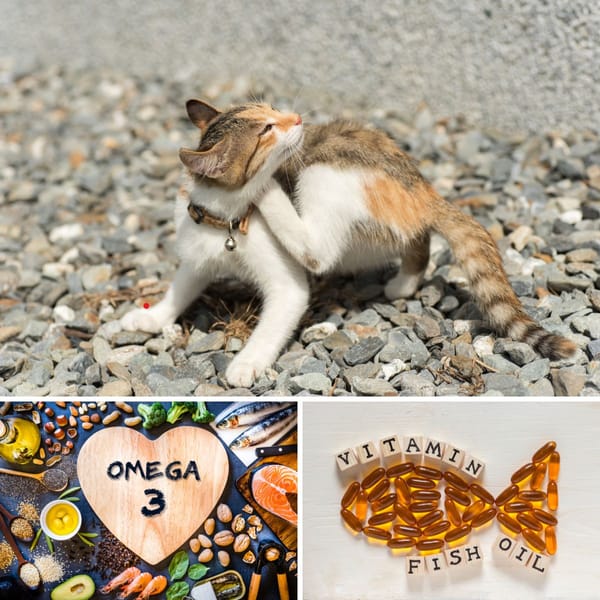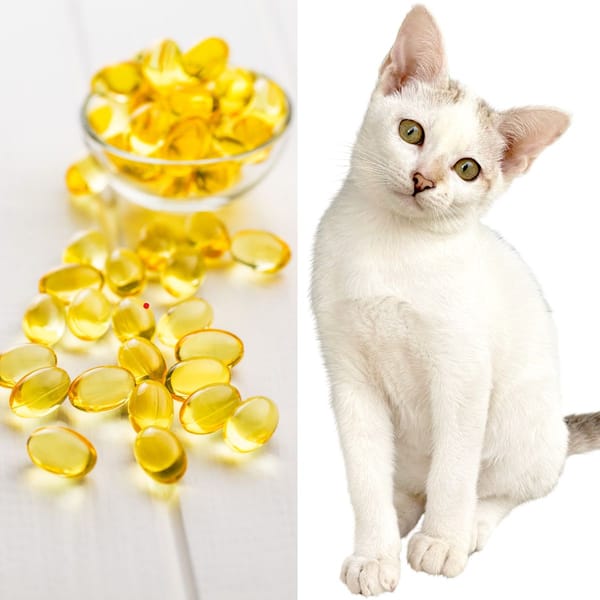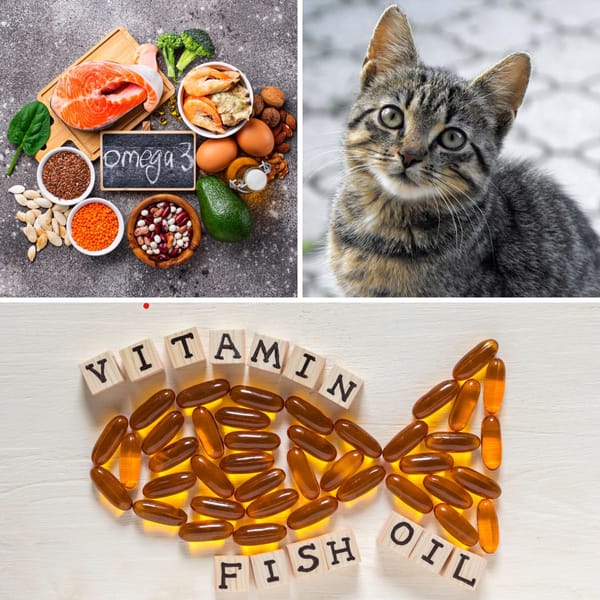Key Takeaways:
- Safety First: Not all human fish oil supplements are safe for cats; consult with a vet before adding to your cat's diet.
- Dosage Matters: The correct dosage of fish oil is crucial for cats to avoid potential side effects.
- Quality Counts: Choose high-quality, third-party-tested fish oil supplements specifically formulated for pets.
Fish oil supplements are a popular dietary addition for many health-conscious individuals, and it's no surprise that pet owners might wonder if the same benefits can be extended to their feline friends. The question "can I give my cat human fish oil" is a valid one, and the answer is not as straightforward as a simple yes or no. This article will delve into the intricacies of fish oil supplementation for cats, the potential benefits and risks, and how to safely incorporate it into your cat's diet.
Understanding Fish Oil Supplements
Fish oil is renowned for its rich content of omega-3 fatty acids, particularly eicosapentaenoic acid (EPA) and docosahexaenoic acid (DHA). These essential fatty acids are known to support heart health, reduce inflammation, and improve cognitive function in humans. But do cats reap the same benefits?
Fish Oil for Cats: Is It Good?
Cats, like humans, can benefit from the addition of omega-3 fatty acids in their diet. These nutrients are vital for maintaining healthy skin, a shiny coat, and overall well-being. They also play a role in brain development and can help manage inflammatory conditions such as arthritis.
Human vs. Feline Fish Oil Supplements
While the basic components of fish oil are similar, human fish oil capsules often contain dosages that are too high for cats. Additionally, some human supplements may include flavorings or other additives that are not suitable for feline consumption. It's crucial to choose a product that is specifically designed for pets.
The Right Dosage for Your Cat
Determining the correct dosage of fish oil for your cat is essential. Too much can lead to negative side effects such as diarrhea or blood clotting issues. It's best to consult with a veterinarian who can recommend an appropriate dosage based on your cat's body weight and health conditions.
Potential Side Effects of Fish Oil in Cats
While fish oil can provide numerous health benefits, there are potential side effects to be aware of. These can include gastrointestinal upset, a fishy odor, and an increased risk of bleeding due to its blood-thinning properties. Monitoring your cat for any adverse reactions is important when introducing new supplements.
Choosing the Best Fish Oil for Your Cat
When selecting a fish oil supplement for your cat, look for products that are third-party tested for purity and potency. Wild Alaskan salmon oil is often recommended due to its high-quality source of omega-3 fatty acids. Ensure the product is free from harmful contaminants and is formulated for pets.
Adding Fish Oil to Your Cat's Diet
Incorporating fish oil into your cat's diet can be done by mixing the oil into their food. Start with a small amount and gradually increase to the recommended dosage. This can help minimize any digestive upset and allows your cat to adjust to the taste.
Omega Fatty Acids: The Secret to a Healthy Feline Coat
Omega fatty acids are not just a buzzword in human nutrition; they're a critical component in maintaining the luster and health of your feline friend's coat. When cat owners include fish oil good in quality in their cat's diet, they're providing essential nutrients that help manage dry skin and reduce shedding. These oils, rich in omega-3 and omega-6 fatty acids, such as linoleic acid and alpha-linolenic acid, nourish the skin from within, ensuring that your cat's skin barrier remains strong and resilient against environmental stressors.
Adding fish oils to your cat's food can be a game-changer, especially for breeds prone to skin issues. The anti-inflammatory properties of these oils can soothe irritated skin, promoting an inflammatory response that's beneficial for cats suffering from allergies or skin conditions. Regular inclusion of these nutritional supplements can lead to a noticeable difference in the softness and shine of your cat's coat, making cuddle time even more enjoyable for both of you. Remember, a shiny coat is often a sign of a happy, healthy cat!
The Role of Coldwater Fish in a Cat's Diet
When it comes to enriching your cat's diet with omega fatty acids, the source of the fish oil matters. Coldwater fish like salmon, mackerel, and sardines are teeming with these beneficial oils. By incorporating fish oil from these species into your cat's food, you're not just enhancing the flavor, you're also contributing to their overall well-being. The cold waters these fish inhabit force them to develop a higher fat content, which is rich in the omega fatty acids crucial for your cat's health.
However, it's not just about tossing a can of tuna into your cat's bowl. The fish oil needs to be refined and free from harmful contaminants that can be present in raw fish. This is where third-party testing becomes invaluable. Products that have been third-party tested for purity ensure that you're giving your cat the highest quality supplement without the risk of toxins like mercury or PCBs. Always look for this certification when choosing fish oil for your cat's food to ensure safety and efficacy.
The Significance of Alpha-Linolenic Acid in Cat's Diet
Alpha-linolenic acid (ALA) is a type of omega-3 fatty acid that plays a crucial role in your cat's diet. While cats are known for their carnivorous habits, incorporating ALA can significantly benefit their overall well-being. This essential nutrient, found in flaxseeds and certain oils, must be obtained through diet as cats cannot produce it themselves. It's vital for maintaining healthy cell membranes and supporting the immune system, which is especially important for middle-aged cats that may begin to experience a decline in physiological functions.
Including alpha-linolenic acid in your cat's food isn't just about internal health; it's also about keeping your cat's skin and coat in top condition. A diet rich in ALA can help to nourish the skin and reduce inflammation, which can lead to a shinier coat and less itching or flakiness. This is particularly beneficial for cats that suffer from skin allergies or dryness. By ensuring your cat's food contains a balanced amount of ALA, you're not only supporting their health but also helping them look their best.
The Importance of Third-Party Testing for Cat Food Supplements
When it comes to adding supplements like fish oil to your cat's diet, it's essential to look for products that have undergone third-party testing. This ensures that the supplement meets certain standards of purity, potency, and safety. Third-party tested products are more likely to be free from contaminants such as heavy metals, which can be harmful to your cat's health. As a responsible pet owner, choosing third-party tested supplements can give you peace of mind knowing that you're providing the best for your feline friend.
Moreover, third-party testing is not just about safety; it's also about efficacy. Supplements that have been verified by an independent organization are more likely to contain the advertised levels of omega fatty acids, including EPA and DHA, which are crucial for your cat's overall well-being. These fatty acids contribute to brain health, reduce inflammation, and support cardiovascular health. By selecting third-party tested fish oil, you're ensuring that your middle-aged cat receives the full benefits of the supplement, helping them to maintain a high quality of life as they age.
Integrating Omega Fatty Acids for Middle-Aged Cats
As cats reach their middle-aged phase, their dietary needs can shift. Just like humans, they may start to experience changes in metabolism, skin elasticity, and cognitive function. Supplementing your cat's diet with omega fatty acids, particularly eicosapentaenoic acid (EPA) and docosahexaenoic acid (DHA), can support their skin's health and cognitive function. Alpha-linolenic acid (ALA), another omega fatty acid found in fish oil, can also play a role in maintaining your cat's skin and coat.
For middle-aged cats, it's crucial to adjust their diet to support their aging bodies. Introducing fish oil into your cat's food can be a game-changer. It's not just about longevity but about enhancing the quality of life. Regularly adding a vet-recommended dose of fish oil to your cat's diet can help maintain their agility, mental sharpness, and overall appearance. Remember, it's always best to consult with your veterinarian to tailor the supplementation to your cat's specific needs and to ensure the correct dosage for optimal health benefits.
The Impact of Fish Oil on Feline Cognitive Health and Aging
As cats enter their middle-aged and senior years, their dietary needs evolve. A diet high in beneficial omega fatty acids can support their overall well-being, including cognitive health. Cognitive tests in older cats have shown that those with a diet supplemented with fish oil maintain sharper minds and exhibit fewer signs of cognitive decline. This is particularly important for cat owners who want to ensure their pets remain alert and engaged throughout their golden years.
Kidney disease and joint pain are common risk factors that plague aging cats. Fish oil benefits these conditions by supporting kidney function and easing the discomfort associated with joint pain. The anti-inflammatory effects of omega fatty acids can help in managing the symptoms of arthritis, providing relief and improving the quality of life for your senior cat. When choosing fish oil supplements, look for products that have undergone third-party testing to guarantee purity and potency. This way, you can be confident that you're giving your cat a safe and effective product to support their aging process gracefully.
Fish Oil Safe Practices for Cats
Always store fish oil supplements in a cool, dark place to prevent them from becoming rancid. Rancid oil can be harmful to your cat and may negate any positive benefits. Additionally, keep an eye on the supplement's expiration date to ensure freshness.
Health Benefits of Fish Oil for Cats
Fish oil can contribute to a cat's overall health by supporting kidney function, promoting wound healing, and aiding in the management of skin conditions. It's also been shown to improve joint health, making it beneficial for cats with arthritic joints.
Specialized Care for Aging Cats
As cats age, they may require specialized care, including dietary supplements. Fish oil can support cognitive function and may help slow cognitive decline in middle-aged and older cats. It's important to tailor the supplementation to your cat's specific needs.
The Role of Veterinary Medicine
Before adding fish oil to your cat's diet, it's imperative to consult with a veterinarian. They can provide guidance on the best fish oil products, the appropriate dosage, and how to monitor for any potential side effects.
Where to Buy Fish Oil for Cats
Fish oil supplements for cats can be found at pet stores, online retailers, or through your veterinarian. Look for products that are specifically labeled for use in cats to ensure safety and efficacy.
Feeding Fish Oil: A Case Study
Consider the case of a middle-aged cat with dry, flaky skin. After a consultation with the vet, the owner began adding a small dose of fish oil to the cat's food. Over time, the cat's skin condition improved, and its coat became shinier and softer.
The Science Behind Fish Oil
Research in veterinary medicine has shown that fish oil can help reduce inflammation and may have a positive impact on the immune system. Its ability to structure cell membranes and support brain health makes it a valuable addition to a cat's diet.
Summary
In conclusion, while human fish oil supplements can offer health benefits to cats, it's essential to choose the right product and dosage. Consult with a veterinarian, opt for high-quality, pet-specific fish oil, and monitor your cat for any changes. With the right approach, fish oil can be a healthy addition to your furry family member's diet.
FAQ Section
Q: Can I give my cat the same fish oil supplement I use? A: It's not recommended to give cats human fish oil supplements due to differences in dosage and potential additives. Always choose a fish oil product formulated for cats.
Q: How much fish oil should I give my cat? A: The dosage of fish oil for your cat should be determined by a veterinarian based on your cat's weight and health needs. Never guess the dosage, as too much can be harmful.
Q: Are there any risks associated with giving my cat fish oil? A: While fish oil can be beneficial, there are risks such as gastrointestinal upset, a fishy odor, and increased bleeding. Always start with a small dose and consult your vet for guidance.







